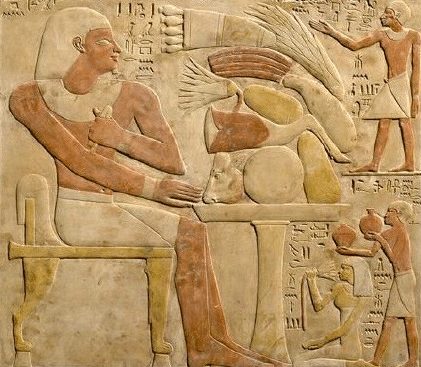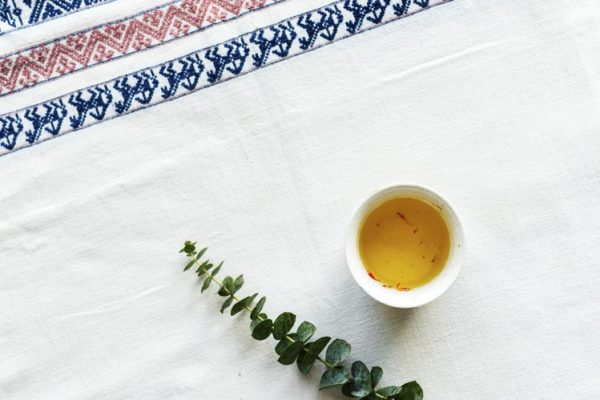Magical and healing?
Magical and healing?
So if you’ve seen BBC2’s documentary ‘Muslims Like Us,’ I’m sure you saw the intense moment in the second episode where Nabil gets a little upset when his onions are used by Ferhan, one of the other housemates. But it seems like there’s a little more to his onions than meets the eye.
As far back as the documentation of modern mankind, we seem to have had onions in their plenty. This image of Stela of Mentuwoser from Abydos dates back to the 3rd century and the feast includes onions in a basket. People from this time period knew about the health benefits of onions, to the extent that they were used in the Mummification of Pharaoh’s, as the strong scent of the onions would prompt the dead to breathe again.
They were considered an object of worship and reverence due to their healing and antiseptic qualities. The onion symbolised eternity as its anatomy contained circles within circles. In addition to this, the onion was useful for sustaining human life as onions prevented thirst and could be dried and preserved for later consumption when food might be scarce.
Holy Scriptures
The onion has been mentioned in several places but namely in the Bible and the Quran.
Bible: Numbers 11:4-6

(4) And the mixed multitude that was among them fell to lusting. And the children of Israel also wept again and said, “Who shall give us flesh to eat?
(5) We remember the fish that we ate in Egypt freely, the cucumbers, and the melons, and the leeks, and the onions, and the garlic;
(6) but our soul is dried away. There is nothing at all besides this manna before our eyes.” (21st Century King James Version)
Here, the Israelites bemoan the loss of things that they regretted leaving behind in Egypt. It is believed that this is due to the onions of Egypt being mild in flavour, slightly sweet and less pungent than others. The important thing to note is that the Israelites wept over the loss of food, which was mainly given to slaves and workers in the pyramids.
Their mindset is rather telling as it showed them desiring a food traditionally given to a workman or a slave, as opposed to food provided from heaven. They were willing to forgo the food from God, that would naturally sustain them both in body and in spirit (by being obedient and satisfied with his provisions) for food from the Earth, to which their palate was accustomed.
Quran: Chapter 2, Verse 61
“And when you said: O Musa! we cannot bear with one food, therefore pray to thy Lord on our behalf to bring forth for us out of what the Earth grows, of its herbs and its cucumbers and its garlic [corn] and its lentils and its onions.
He said: Will you exchange that which is better for that which is worse? Enter any city, so you will have what you ask for.”
The Quranic verse refers to the same occasion, but ends with Musa berating them for exchanging “that which is better for that which is worse.” Here it shows that they were given the chance for the nourishment, which Allah (swt) would provide for them, direct from the heavens. Instead, the bemoaned the food of the heavens and asked Musa to pray to his Lord for the food that they could have effectively found anywhere, in any city, as the verse suggests.
Onions in Hadiths
Jaffar Al-Sadiq (peace be upon him) has said: “Onions clean dirt from the teeth and sputum. They lesson fatigue and laziness, strengthen the veins and the muscles and the roots of the teeth. It also helps to increase offspring, beautifies the complexion and cures fevers.”
The Holy Prophet (peace be upon him and his progeny) has said: “Whenever a person visits any new city, he should eat the onions grown there so that he may be safe from all the diseases of that city.”
The Holy Prophet (peace be upon him and his progeny) has said: “He who eats onion and garlic should not come near our masjid.” – Sunan Abu Dawud: Hadith 3818.
This is one of the select few narrations which suggest that the eating of onions is not permitted bit Muhammed Al-Baqir (peace be upon him) explains that this was due to the pungent smell of these vegetables being overbearing. He explains that the narration should continue with the Prophet’s recommendation to cook it, so as to remove the odour, before entering a gathering, so as not to make others around you uncomfortable.
Key tip – to get rid of the smell of onions and garlics, rinse your hands with cold water, rub them with salt, then rinse and wash with soap. To remove the odour from your breath, eats a few sprigs of parsley or dive in for an apple!
Health benefits and remedies
- Onions are rich in natural sugars, Vitamins A, B6, C and E, in addition to minerals such as potassium, iron, sodium and are a good source of folic acid.
- Red onions cooked with eggs and sesame oil to for colds and coughs
- Using crushed onion bulb juice for ear infections
- Placing a sliced onion onto the heel of someone with a high temperature (I’ve actually tried this one – works a treat!)
- Eating bulbs to help with respiratory problems, and for the bladder, kidney stones and inflammation
- Applying sliced onions on the head to cure a headache
Please note that these are home remedies and should not be a replacement for seeing a doctor or taking prescribed medication.
For more, read about the phytochemical and health properties of an onion, provided by the American National Onion Association (yes, it’s a real research centre!)





